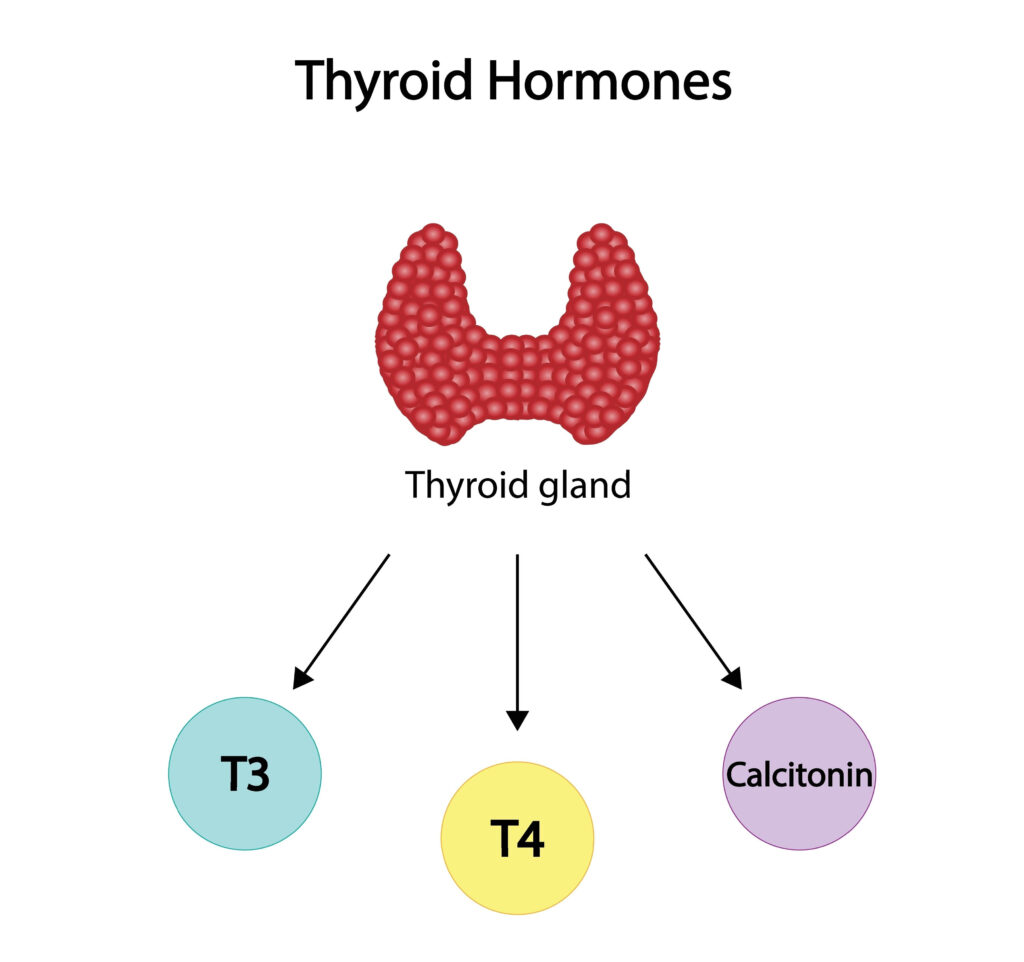What's On This Page?
ToggleWhen it comes to safeguarding your well-being and finding a thyroid imbalance, understanding who your symptoms can get misdiagnosed is important. I think of myself when I was in my 40’s and my own thyroid-related symptoms were overlooked and I had to cure myself!
I made lemonade out of that, and I didn’t suffer very long at all, maybe a year or two at best! As you may already know, I wrote a book on the topic “Thyroid Healthy” and went on to form a custom line of various supplements for this very problem. Today I want to show you how easy it is to have a thyroid condition overlooked.
What happens is the symptoms you have get misdiagnosed as another disease. (At least that’s what worries me, it happened to me). So right up front, I want you to know that is what I’m worried about for you.
That’s a big problem. You will then likely be over-medicated with all of the wrong drugs. Worse than that, all the new drugs will cause you to still feel bad, maybe worse than you originally felt!

6 Overlooked Signs of Thyroid Imbalance
1. Fatigue
Let’s first grasp the thyroid’s role in maintaining good health. The thyroid produces hormones, namely thyroxine (T4) and triiodothyronine (T3). The T3 is the one that is most biologically active influencing how warm you feel, and how fast you burn off weight. It also is the hormone that makes you feel happy, as happy as what an antidepressant does in your body!
Thyroid hormones influence the activity of every cell in our body. But some people have a hard time making T4, or converting it to the more active “happy” T3. I have a supplement at my shop for that very problem called Thyroid Script. It can help with thyroid imbalance, activation of T4 to T3.
Anyway, if you go to doc feeling tired and lethargic, you might be pinned with Chronic Fatigue Syndrome, or you might be told you’re just stressed or depressed.
Energy levels are 100 percent correlated with thyroid imbalance. Period! A simple “thyroid profile” blood test will reveal your levels.
2. Weight Changes
An underactive thyroid may lead to stubborn weight loss, or slow weight gain. It can also cause weight fluctuations if you have Hashimoto’s.
Many other factors cause weight gain, not just low thyroid too. But the point is your thyroid gland is a fat burner, and as such if it is “asleep” and not pumping out enough T4 (or not converting it to T3), or not getting into the cell, then weight gain will be present. Witnessing these weight changes and becoming aware of them may signal a thyroid imbalance in progress, probably one that is autoimmune if the weight fluctuates.
3. Hair and Skin and Nails will Show a Thyroid Imbalance
Dry or itchy skin, brittle hair and broken nails? This is another way to see in your appearance the condition of hypothyroidism. Also, losing the outer edges of your eyebrows is telltale. Dry skin is something I’m good at fixing, have you seen my DRENCH hydrogel moisturizer yet? It is designed for your face, but my customers tell me that they put it everywhere because it contains a natural plant-derived gentle antihistamine, so it takes down itching and redness!
One person has her massage therapist use a little on her back during massage. When I formulated this, I had no idea people would be putting it everywhere. You can find it on Amazon by CLICKING HERE. It can help your skin retain moisture too.
4. Mood Swings and Depression
Thyroid imbalances may cast a shadow of depression, anxiety, and brain fog over your daily activities. Insomnia too! Some doctors are quick to fix this with a drug that will most likely become lifelong in terms of duration.
In other words, once you start certain pills, it’s super hard and difficult to ever get off them! You’ve heard me say this before, it’s good to “think outside the pill” before going down the rabbit hole of benzos, antidepressants, and psychoactive medications. Isn’t it easier to fix the thyroid imbalance? Yes of course!
In my book about thyroid, I mention lots of herbs and supplements that you can take. Other things you can do include the most simplest such as seeing an endocrinologist that really listens to you, and has a good track record of treating thyroid disease. Sometimes a blend of medications are needed, it’s not just all about Synthroid® or Armour® while those are good, sometimes Cytomel® (Liothyroidine) is needed too. Your doctor will decide.
Not all doctors have this type of experience, they just prescribe one pill for you and keep upping the dose. That’s not good. You can and should start eating better and exercising to your level. I would FIRST consider natural remedies and vitamins that are known to improve activation of T3 to help with thyroid imbalance.
5. Digestive Problems are a Sign of Thyroid Imbalance
Constipation, the slow and steady beat of hypothyroidism, or the hurried tempo of frequent bowel movements in hyperthyroidism – your digestive system may be dancing to the thyroid’s rhythm which slows down. Constipation is a very common overlooked symptom of thyroid disease.

Elevate your diet with thyroid-supportive foods and embrace iodine-rich delights like seaweed, fish, and eggs. Let selenium-rich foods such as Brazil nuts and spinach take center stage. Say goodbye to processed foods, gluten, and refined sugary treats because those will heighten your thyroid problems.
6. Fertility Issues like PCOS
This STUDY discusses the growing recognition of a link between polycystic ovary syndrome (PCOS) and autoimmune thyroid diseases. This thyroid imbalance can lead to fertility problems.
While the exact cause of this connection is not clear, both conditions influence each other and as more research emerges, we may come to find out that the risk factors for both PCOS and thyroid illness are the same.
We do know that there are unique factors contributing to each disease, but there is still overlap. Polycystic ovaries can be a symptom of hypothyroidism, so your blood work should be done. And hypothyroidism should be ruled out before diagnosing PCOS.
Both PCOS and thyroid imbalance (of any sort) have common factors although one person may not experience all of these. There could be obesity, increased insulin resistance, elevated leptin hormone, and immune system conditions. These factors (and others I haven’t mentioned) seem to play a role that links the two conditions. And as you know, I don’t trust the lab tests that typical laboratories run. READ MORE ON THAT HERE.
Supplements help with Thyroid Imbalance
Supplements, the nutritional overture to thyroid balance, can play a crucial role. Consult with a healthcare professional to determine the supplements – be they omega-3 fatty acids, vitamin D, or ZINC– that may take center stage in your personalized thyroid concerto.

Summary
Thyroid illness is often overlooked due to the nature of the symptoms which can fit with many other conditions. But if you have two or three (or all!) of the above symptoms, I would urge you to see a doctor who is skilled in treating thyroid disease.
When I say skilled, I mean the kind that will help you replace the missing thyroid hormones with medications and embrace the use of natural co-factors that help you activate those medications (which are often precursors).
I would also urge you to experiment with adrenal supplements because adrenal fatigue often goes hand in hand with suppressed thyroid disease. A formula with ashwagandha could be super useful because that adaptogen is known to support both the thyroid gland and adrenal glands.* Imagine feeding two birds with one seed!
It’s good to share your issues and health problems with a trusted loved one or friend. They may be wondering why you are always wanting to stay home, or not participating in family events. They may be trying to figure out if you’re upset with them vs. apathetic due to illness. A thyroid imbalance will prevent you from living life to the fullest. It can cause anxiety, insomnia, changes in your appearance and mood, as well as intractable fatigue! Keep a journal or app on your phone to help you remember symptoms each day this will help your doctor too.

Suzy Cohen, has been a licensed pharmacist for over 30 years and believes the best approach to chronic illness is a combination of natural medicine and conventional. She founded her own dietary supplement company specializing in custom-formulas, some of which have patents. With a special focus on functional medicine, thyroid health and drug nutrient depletion, Suzy is the author of several related books including Thyroid Healthy, Drug Muggers, Diabetes Without Drugs, and a nationally syndicated column.

